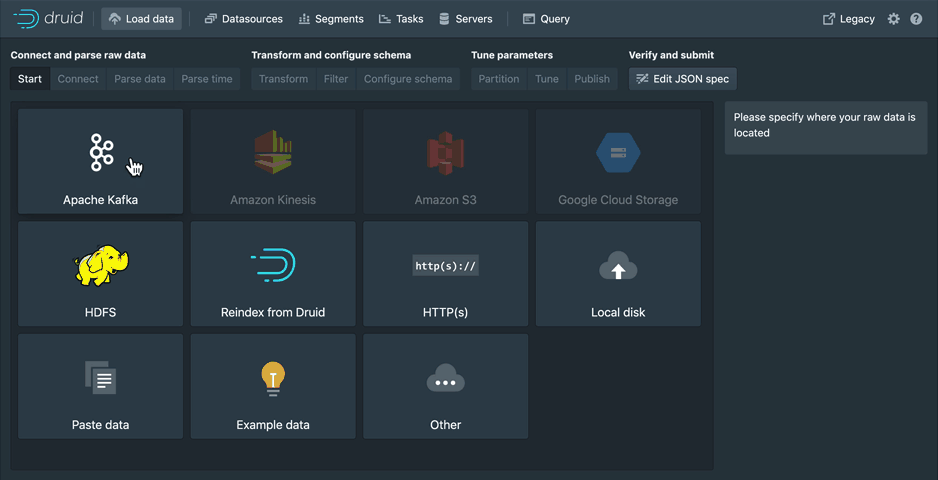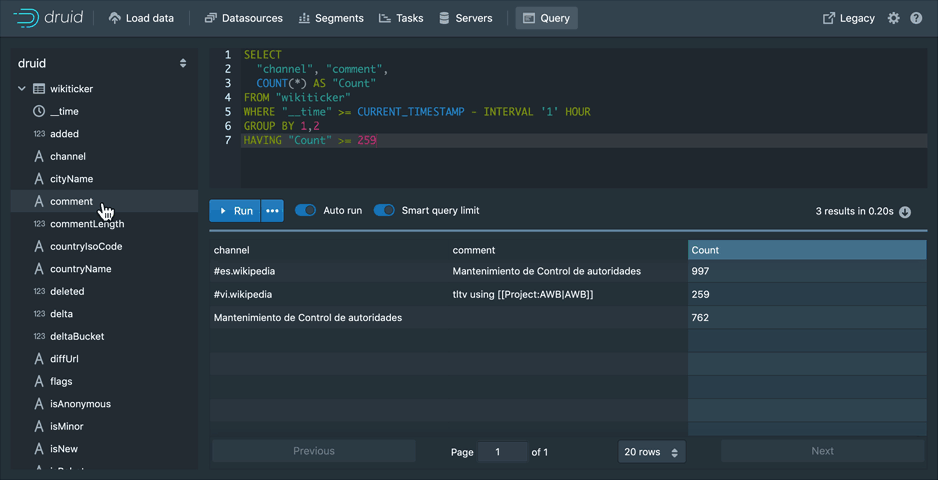* SQL: Allow Scans to be used as outer queries. This has been possible in the native query system for a while, but the capability hasn't yet propagated into the SQL layer. One example of where this is useful is a query like: SELECT * FROM (... LIMIT X) WHERE <filter> Because this expands the kinds of subquery structures the SQL layer will consider, it was also necessary to improve the cost calculations. These changes appear in PartialDruidQuery and DruidOuterQueryRel. The ideas are: - Attach per-column penalties to the output signature of each query, instead of to the initial projection that starts a query. This encourages moving projections into subqueries instead of leaving them on outer queries. - Only attach penalties to projections if there are actually expressions happening. So, now, projections that simply reorder or remove fields are free. - Attach a constant penalty to every outer query. This discourages creating them when they are not needed. The changes are generally beneficial to the test cases we have in CalciteQueryTest. Most plans are unchanged, or are changed in purely cosmetic ways. Two have changed for the better: - testUsingSubqueryWithLimit now returns a constant from the subquery, instead of returning every column. - testJoinOuterGroupByAndSubqueryHasLimit returns a minimal set of columns from the innermost subquery; two unnecessary columns are no longer there. * Fix various DS operator conversions. These were all implemented as direct conversions, which isn't appropriate because they do not actually map onto native functions. These are only usable as post-aggregations. * Test case adjustment. |
||
|---|---|---|
| .github | ||
| .idea | ||
| benchmarks | ||
| cloud | ||
| codestyle | ||
| core | ||
| dev | ||
| distribution | ||
| docs | ||
| examples | ||
| extendedset | ||
| extensions-contrib | ||
| extensions-core | ||
| helm/druid | ||
| hll | ||
| hooks | ||
| indexing-hadoop | ||
| indexing-service | ||
| integration-tests | ||
| licenses | ||
| processing | ||
| publications | ||
| server | ||
| services | ||
| sql | ||
| web-console | ||
| website | ||
| .asf.yaml | ||
| .backportrc.json | ||
| .codecov.yml | ||
| .dockerignore | ||
| .gitignore | ||
| .lgtm.yml | ||
| .travis.yml | ||
| CONTRIBUTING.md | ||
| LABELS | ||
| LICENSE | ||
| NOTICE | ||
| README.md | ||
| README.template | ||
| check_test_suite.py | ||
| check_test_suite_test.py | ||
| licenses.yaml | ||
| owasp-dependency-check-suppressions.xml | ||
| pom.xml | ||
| setup-hooks.sh | ||
| upload.sh | ||
README.md
Website | Documentation | Developer Mailing List | User Mailing List | Slack | Twitter | Download
Apache Druid
Druid is a high performance real-time analytics database. Druid's main value add is to reduce time to insight and action.
Druid is designed for workflows where fast queries and ingest really matter. Druid excels at powering UIs, running operational (ad-hoc) queries, or handling high concurrency. Consider Druid as an open source alternative to data warehouses for a variety of use cases. The design documentation explains the key concepts.
Getting started
You can get started with Druid with our local or Docker quickstart.
Druid provides a rich set of APIs (via HTTP and JDBC) for loading, managing, and querying your data. You can also interact with Druid via the built-in console (shown below).
Load data
Load streaming and batch data using a point-and-click wizard to guide you through ingestion setup. Monitor one off tasks and ingestion supervisors.
Manage the cluster
Manage your cluster with ease. Get a view of your datasources, segments, ingestion tasks, and services from one convenient location. All powered by SQL systems tables, allowing you to see the underlying query for each view.
Issue queries
Use the built-in query workbench to prototype DruidSQL and native queries or connect one of the many tools that help you make the most out of Druid.
Documentation
You can find the documentation for the latest Druid release on the project website.
If you would like to contribute documentation, please do so under
/docs in this repository and submit a pull request.
Community
Community support is available on the druid-user mailing list, which is hosted at Google Groups.
Development discussions occur on dev@druid.apache.org, which you can subscribe to by emailing dev-subscribe@druid.apache.org.
Chat with Druid committers and users in real-time on the #druid channel in the Apache Slack team. Please use this invitation link to join the ASF Slack, and once joined, go into the #druid channel.
Building from source
Please note that JDK 8 is required to build Druid.
For instructions on building Druid from source, see docs/development/build.md
Contributing
Please follow the community guidelines for contributing.
For instructions on setting up IntelliJ dev/intellij-setup.md







